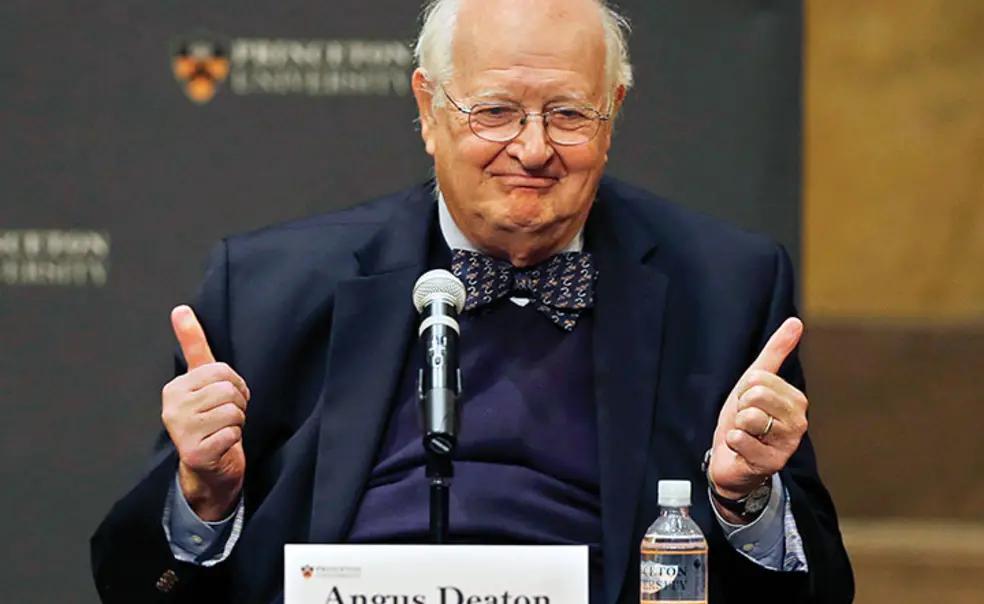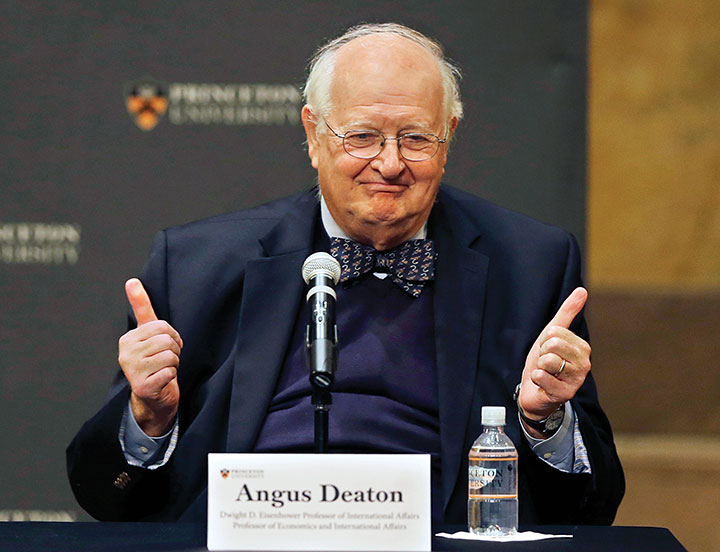Deaton Wins Nobel
Optimistic economist cited for studies showing how personal decisions matter
Although the 19th-century Scottish philosopher Thomas Carlyle called economics “the dismal science,” Carlyle never knew his countryman economist Angus Deaton.
Deaton, the recipient of the 2015 Nobel Prize in economics, is affable and, by the standards of some in his field, an optimist. He believes that the trend of society has been upward. In his 2013 book, The Great Escape (Princeton University Press), Deaton, who is appointed jointly in the economics department and the Woodrow Wilson School, concluded that by almost any measure — income, life expectancy, health, or happiness — humanity is better off now than it has ever been.
President Eisgruber ’83 said he frequently gives out copies of the book as gifts, and it quickly sold out at Labyrinth Books on Nassau Street. Deaton is no Pollyanna, though, seeing threats from rising economic inequality, slowing rates of economic growth, and global warming. “[T]here is a danger that the rapid growth of top incomes can become self-reinforcing,” Deaton wrote in The Great Escape, “through the political access that money can bring.”
Deaton, who has taught at Princeton since 1983, received the Nobel Prize in recognition of his groundbreaking work studying the ways in which the economic behavior of individuals influences broader economic patterns. Unlike many economists, he has relied on surveys of individual households rather than national economic statistics to gain deeper insights into the factors driving economic development.
As the Royal Swedish Academy of Sciences stated in its announcement, “To design economic policy that promotes welfare and reduces poverty, we must first understand individual consumption choices. More than anyone else, Angus Deaton has enhanced this understanding.”
He also is known for discovering an anomaly that sudden changes in income don’t immediately lead to equivalent changes in consumption; consumption changes more slowly, a phenomenon that has come to be known as the Deaton Paradox.
At a press conference in Richardson Auditorium, Deaton, 70, wearing a bow tie and sweater vest and speaking with a light Scottish brogue, said he had received the news when his phone rang shortly after 6 a.m. and a “very Swedish voice” told him he had won the Nobel Prize. Aware that he had been mentioned in advance as a possible award winner, Deaton joked that he did not think the call was a prank until the caller kept reassuring him that it was not a prank — at which point he began to wonder if it might be a prank after all.
Deaton also spoke about the importance of accurate economic data in his work. “I feel passionately about measurement,” he said, “about how difficult it is, how much theory and conceptualization is involved in it, and indeed how much politics is involved in it.”
Colleagues and former students were unanimous in their praise for Deaton as a teacher, colleague, and friend. Harvard professor Dani Rodrik *85 took a course Deaton taught on econometrics in his first year at Princeton. “He was a superb teacher,” Rodrik recalled. “I have not learned as much from any other econometrics course.”
Indeed, economist Bo Honoré canceled his morning class, suggesting that students attend Deaton’s press conference instead. “I think that you will get much more out of going to that than of the marginal econometrics lecture,” he emailed his students.
In his blog for The New York Times, professor emeritus Paul Krugman, himself a Nobel economics laureate in 2008, praised Deaton’s “dogged, careful empirical work at the micro level, tracking and making sense of individual households, their choices, and why they matter.”
Deaton becomes the 10th member of Princeton’s current faculty to win a Nobel Prize and the eighth faculty member to win it in economics. He will receive a prize of eight million Swedish krona, equivalent to approximately $962,000. Deaton is married to Anne Case *83 *88, a Princeton professor of economics and public affairs.













No responses yet